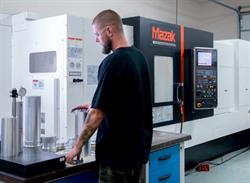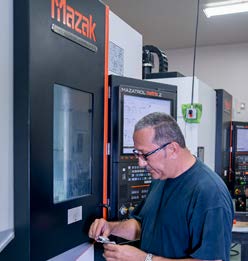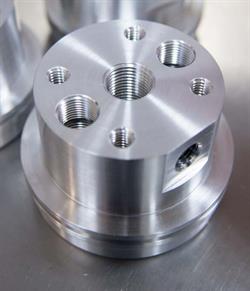LCP Machine Inc. Success Story

Edward Lafferty, CEO and founder of LCP Machine Inc., admits his strategy to win work can be a bit risky at times and one where the shop often flies by the seat of its pants, or in this case, its parts. Instead of quoting a new job based on its existing machine tools, the Bunnell, Florida, shop focuses acutely on the parts to determine what would be the ultimate best-matched technology for producing them. It then prices the job accordingly – regardless if that particular ideal piece of equipment is on the LCP shop floor or not.
The goal is to provide customers with the highest quality, shortest delivery times and most value. If the non-existent technology bid happens to win the job, nine times out of 10, the ends – or profits – according to Lafferty, justify the means – actually purchasing the piece of equipment. And quite often, the new technology also helps improve the production of existing jobs while providing additional capacity to take on new work.
Such risk taking is how LCP expanded into the aerospace and defense sector. In addition to acquiring its AS-9100 certification and ITAR Registration, the shop quoted and won several jobs based on machining technologies, such as full 5-axis and multi-tasking, it had yet to acquire.
Today, the shop is a Tier II and III level supplier in aerospace and defense as well as a Tier I in oil and gas. It currently processes over 200 different individual jobs per month, with quantities that range from one to 10,000 pieces. Some jobs repeat, but for the most part, they are brand new ones.
“To truly be successful and grow, shops must go beyond quoting jobs based solely on their existing machining technology,” explained Lafferty. “Shops have to be aggressive and willing to acquire the right equipment that will not only win the work price wise, but ensure a reasonable profit as well. Yes, the approach can be risky, but the key is to partner with a dependable, forward thinking, innovative and proactive machine tool supplier, which can significantly lower that risk. And for us, that supplier has and continues to be Mazak.”
 LCP has about 14 Mazaks and among the most recent are a QUICK TURN NEXUS (QTN) 350-II MSY Multi-Tasking machine and some VERTICAL CENTER UNIVERSAL (VCU) 400A 5X and 300A 5X full 5-axis vertical machining centers. Existing machines include several other multi-tasking QTNs with milling capabilities, 3-axis VERTICAL CENTER NEXUS (VCN) vertical machining centers and a VCN COMPACT vertical machining center.
LCP has about 14 Mazaks and among the most recent are a QUICK TURN NEXUS (QTN) 350-II MSY Multi-Tasking machine and some VERTICAL CENTER UNIVERSAL (VCU) 400A 5X and 300A 5X full 5-axis vertical machining centers. Existing machines include several other multi-tasking QTNs with milling capabilities, 3-axis VERTICAL CENTER NEXUS (VCN) vertical machining centers and a VCN COMPACT vertical machining center.
The QTN 350-II MSY features milling and Y-axis capabilities as well as a second turning spindle to process LCP’s parts in DONE IN ONE® operations. Mazak’s 5-axis VCUs bring advanced technology and production value to the shop’s high-precision small parts processing. The machines are simple but innovative and feature rotary/tilt trunnion tables, 40-taper spindles and automatic tool changers. Plus, their sizes make for easy installation.
LCP’s VCN COMPACT 3-axis machining center allows the shop to quickly and accurately process small, complex parts from tougher materials, including stainless steel, Inconel® and titanium, in low, medium and high volumes. The machine is perfect for tight spaces, yet sports a 40-taper, 20,000-rpm spindle.
According to Lafferty, another way to win new and additional work from existing customers is to always deliver jobs early – well before specified delivery dates – regardless of workloads. LCP accomplishes this with a 75 percent-capacity strategy, meaning Lafferty books work for three quarters of the shop’s capacity and reserves the remaining quarter for those last-minute, high-priority jobs.
“Our 75 percent strategy keeps current jobs running uninterrupted to ensure early deliveries, while allowing us to be the hero shop that always comes through and meets the needs of those customers with urgent last-minute work,” explained Lafferty. “We bail our customers out of tight situations, and, in turn, they offer us more work – typically steady non-emergency production jobs. Amazingly, our 25 percent of set aside capacity rarely goes unused during the course of a week because we always seem to have incoming emergencies. We are a service to our customers, and we will take on any job they send our way. We can do this because we are efficient and agile – and most importantly – we use the right equipment.”
 LCP makes the majority of its parts from aluminum, stainless and nickel alloys, along with brass, copper and several common types of plastics. Parts measure anywhere from 0.030” in diameter up to 18” in diameter and 60” long, with others as big as 24” x 48” in size. Tolerances can range from +/- 0.001” to as tight as 0.0002”, and machining times vary from 10 short seconds to as long as eight hours.
LCP makes the majority of its parts from aluminum, stainless and nickel alloys, along with brass, copper and several common types of plastics. Parts measure anywhere from 0.030” in diameter up to 18” in diameter and 60” long, with others as big as 24” x 48” in size. Tolerances can range from +/- 0.001” to as tight as 0.0002”, and machining times vary from 10 short seconds to as long as eight hours.
With advanced technologies such as multi-tasking and full 5-axis machining, LCP often completes parts in single setups. One such part is an enclosure for a military sonar device machined on the Mazak QTN 350-II MSY – a machine acquired specifically for that job. The shop runs (DONE IN ONE) about 10,000 of these parts per year. Had it quoted the job based on existing capabilities, LCP would have had to price the job two times higher as compared with the amount it did quote to win the job.
The sonar part requires O.D. and I.D. turning and some milling. But the real challenge is the I.D. surface finish, which, when LCP first considered, would need to be farmed out for honing. The honing operation would have added extensive time to the job. But knowing the capabilities of the QTN 350-II MSY, LCP explained to the customer how they could make the part in a single operation, maintain the required surface finish in only key needed areas and stay well within the customer’s price point while leaving LCP a comfortable profit margin.
“The QTN 350-II MSY completes a sonar part in minutes as opposed to hours and reduces the production cost by almost 90 percent,” added Lafferty. “We simplified the design, which then made machining it much easier and faster and less expensive. A savings we passed down to the customer.”
“While the QTN 350-II MSY lets us produce the sonar part completed in one operation for job cost effectiveness,” explained Lafferty. “A second-spindle machine is not always the best way to process a job. Sometimes processing the parts on our other turning centers without second spindles – having one guy run two of them – is the more productive and cost-effective route. It all depends on a part’s geometries and complexity along with job volumes as well as set up and run times.”
For instance, a low-volume short-running job, for LCP, is better done with the two-machine cell approach. So, one machine would do the front end work, while the second machine performs the backwork.
LCP continues to take on additional amounts of high-volume jobs. And as it does, Lafferty foresees the need for more dual-spindle DONE-IN ONE machines like its QTN 350-II MSY.
LCP’s 5-axis VCUs make it possible to access, in one setup, all of the part surfaces that need to be machined. The shop also achieves extremely tight customer-required, true perfect positioning tolerances. These must be held among multiple part features in relation to one another.
For a field soldier personal communication systems component, the Mazak 5-axis machines transformed a barely profitable job that used to run on 3-axis machines into a huge moneymaker. Plus, according to Sean Lafferty, president at LCP Machine Inc. and Edward’s brother, the shop has had several such successes with other jobs as a result of its continually expanding Mazak 5-axis machining capabilities.
“Small footprints and the fact that they are true 5-axis machines is what really attracted us to the Mazak VCUs,” said Lafferty. “We don’t need big machines for our size 5-axis parts – at least not yet. For us, being limited to only machines that are too big for our parts proved challenging in terms of small part access and clearance issues. So, we were thrilled when Mazak came out with the VCU machines that deliver cost-effective 5-axis performance and capabilities.”
Most of LCP’s 22 machinists have between 20 and 30 years of experience and practically all of them can program, set up and run their jobs. Plus, LCP believes in keeping its employees well compensated. And according to both Lafferty and his brother Sean, this is the reason the shop has never had a machinist quit.
According to Lafferty, the shop quotes as much as $40 million worth of work per year and currently runs many of its Mazaks lights out, but minus any full-blown automation. On its vertical machining centers, for instance, the shop loads multiple parts and those with long machining times that will then run over night, while certain turning centers are equipped with bar feeding capability. However, Lafferty wants to eventually automate to allow machines to run nonstop regardless of individual part machining times.
“We specialize in medium to high-volume short-run production work and actively pursue long running contract work to further grow the business,” explained Lafferty. “And to win and cost effectively run those types of jobs, we will rely more heavily on automated, lights-out operations.”
As a precision shop in the production of aerospace and defense components, along with those for the oil and gas and other industries, LCP’s customers continue to demand higher quality and lower prices. And both Edward and Sean said that LCP, in turn, expects the same from its machine tool suppliers.
“We constantly need new machining technology, but most importantly, we need it backed by excellent service and support. And that’s what we get with Mazak,” commented Lafferty.
